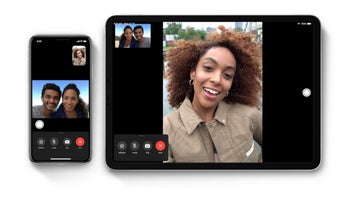Apple agrees to pay $18 million to settle class-action suit over FaceTime

According to AppleInsider, Apple has agreed to settle a class-action suit for $18 million. The plaintiffs had claimed that Apple intentionally disabled FaceTime on their iPhone 4 and iPhone 4s models in 2014 in order to save money. Typical of a class action suit, members of the class are estimated to each receive a whopping $3 for each device they claimed in the suit. If some class members decide not to cash their checks, a second distribution will be made. The two named or lead plaintiffs, Christina Grace and Ken Potter are both in line to receive $7,500. And the attorneys for the plaintiffs will be awarded $5.4 million in fees and another $1.1 million in expenses. But this won't be a money maker for them since they estimate that their expenses amounted to $8,398,910.
Apple broke FaceTime on iOS 6 in an attempt to force iPhone 4 and iPhone 4s users to upgrade to iOS 7
When FaceTime launched in 2010, Apple used two different methods to made the feature work. One was a peer-to-peer direct connection between the two devices involved in a FaceTime call. The other method involved routing FaceTime calls through third-party servers which made them more expensive to Apple than the peer-to-peer method. But in 2012, Apple directed all FaceTime calls through third-party servers after a court found that Apple infringed on peer-to-peer patents owned by VirnetX. As more iPhone users started to use FaceTime, Apple was forced to shell out millions of dollars. Apple claimed that VirnetX's patent covered a very small part of a large complex technology and that Apple infringed on the patent inadvertently. An attorney who represented the plaintiff claimed that Apple engineers didn't bother looking at patents while developing FaceTime.
FaceTime Lawsuit Settlement... by Mikey Campbell on Scribd


Apple finally developed a new peer-to-peer method in iOS 7, but the company had trouble convincing iPhone 4 and iPhone 4s users to update thanks to rumors that older models were having issues with the new iOS build. The plaintiffs claimed that Apple broke FaceTime on their devices in iOS 6 to force them to upgrade to iOS 7 so that the company could save money with the new FaceTime peer-to-peer technology. Without iOS 7, FaceTime wouldn't work properly on the two aforementioned iPhone models.
A couple of emails from Apple engineers quoted in the court filing seem to indicate that Apple did exactly what the plaintiffs claimed. One read, "Hey, guys. I'm looking at the Akamai contract for next year. I understand we did something in April around iOS 6 to reduce relay utilization." The other email said, "It was a big user of relay bandwidth. We broke iOS 6, and the only way to get FaceTime working again is to upgrade to iOS 7." Apple sought to have the case dismissed in 2017 by pointing out that the class didn't suffer any economic loss from its actions because FaceTime is a free service. The motion was denied by Judge Lucy Koh. On September 3rd, the settlement will most likely be agreed to by Judge Koh.
FaceTime was unveiled by then Apple CEO Steve Jobs for the iPhone 4 on June 7, 2010. Originally available in the U.S. over Wi-Fi, in 2012 the feature became available over cellular networks in the states. While Verizon and Sprint allowed FaceTime over cellular on both tiered and unlimited accounts, AT&T only allowed Mobile Share customers to use the video chat app over a cellular network. All of its unlimited subscribers were forced to continue using Wi-Fi for FaceTime. Taking this stance resulted in a trip to Washington D.C. for AT&T brass as the company was hit with several net neutrality violations.










Things that are NOT allowed: